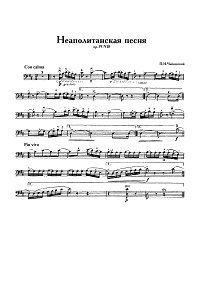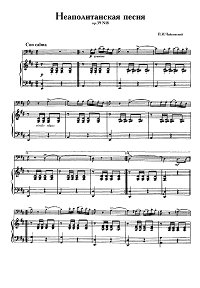Tchaikovsky – Neapolitan song Op. 39 N18 for cello and piano
Tchaikovsky – Neapolitan song Op. 39 N18 for cello and piano. You can download the PDF sheet music Tchaikovsky – Neapolitan song Op. 39 N18 for cello and piano on this page. This interesting musical creative is the unique masterpiece for string instrument by the brilliant composer. This musical work impresses everybody by the beautiful cello melody and traditional string features. This musical opus surprise the listeners by the rich and specific rhythmical tones of piece and other dramatic characteristics.
To view the first page of Tchaikovsky – Neapolitan song Op. 39 N18 for cello and piano click the music sheet image.
|
| PDF format sheet music |
|
|
|
Cello part: 1 pages. 369 K
|
Piano part: 2 pages. 1032 K
|
 |
 |
|
|
| Download PDF (14.99
€) |
Download PDF (14.99
€) |
| Pyotr Ilyich Tchaikovsky (1840 – 1893), a Russian composer of the late-Romantic period, some of whose works are among the most popular music in the classical repertoire. He was the first Russian composer whose music made a lasting impression internationally, bolstered by his appearances as a guest conductor in Europe and the United States.
Although musically precocious, Tchaikovsky was educated for a career as a civil servant. There was scant opportunity for a musical career in Russia at that time and no system of public music education. When an opportunity for such an education arose, he entered the nascent Saint Petersburg Conservatory, from which he graduated in 1865. The formal Western-oriented teaching he received there set him apart from composers of the contemporary nationalist movement embodied by the Russian composers of The Five, with whom his professional relationship was mixed. Tchaikovsky's training set him on a path to reconcile what he had learned with the native musical practices to which he had been exposed from childhood. From this reconciliation, he forged a personal but unmistakably Russian style—a task that did not prove easy. The principles that governed melody, harmony and other fundamentals of Russian music ran completely counter to those that governed Western European music; this seemed to defeat the potential for using Russian music in large-scale Western composition or from forming a composite style, and it caused personal antipathies that dented Tchaikovsky's self-confidence. Russian culture exhibited a split personality, with its native and adopted elements having drifted apart increasingly since the time of Peter the Great. This resulted in uncertainty among the intelligentsia about the country's national identity—an ambiguity mirrored in Tchaikovsky's career. |
|